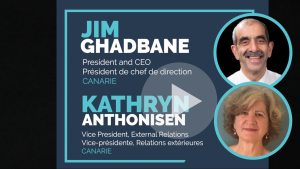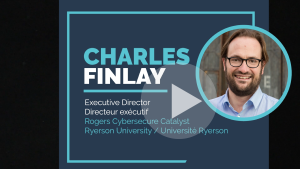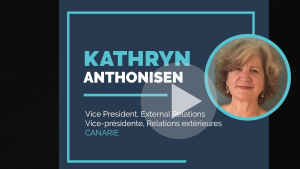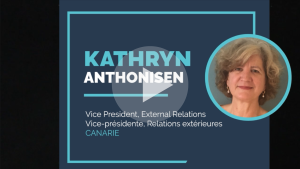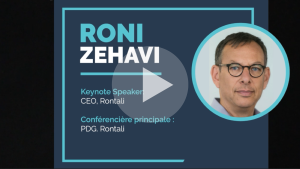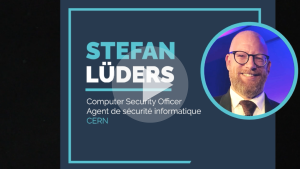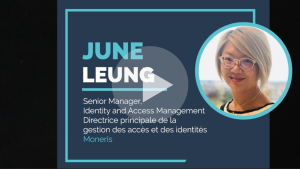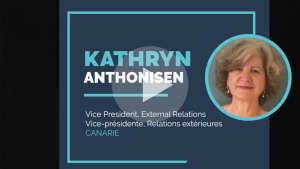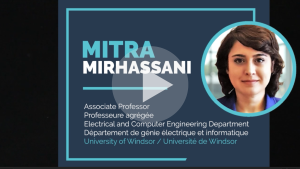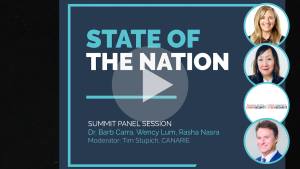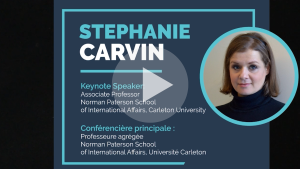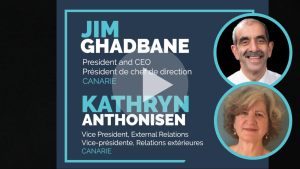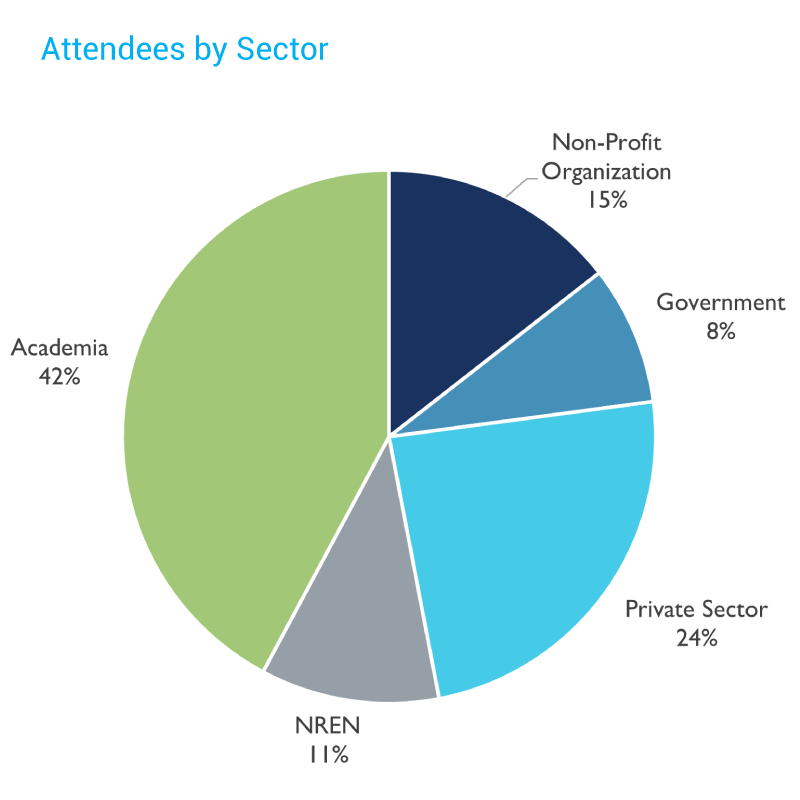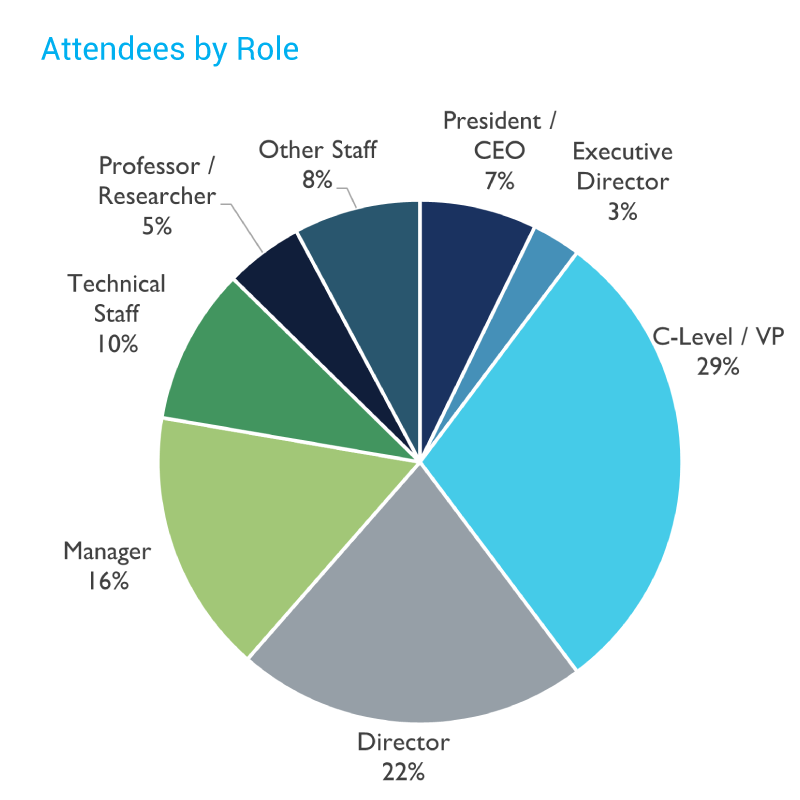The threats we face are unlike anything we’ve seen before, but so are the opportunities to collaborate on better defenses. Let’s rethink cybersecurity.
The last CANARIE Summit focused on the multiple facets of cybersecurity – privacy, Whitehat hackers, the latest research, and the beginnings of coordinated cybersecurity efforts across the country.
A lot has happened since then.
The 2021 CANARIE Summit revisits cybersecurity by diving into what it takes to secure Canada’s research and education sector, while making Canada a leader in cybersecurity expertise, infrastructure, and innovation.
- Learn from global cybersecurity experts
- Contribute to ongoing discussions
- Engage with leading Canadian innovators and researchers

Day 1 – Building the Team
People have the potential to be both the strongest and the weakest link in the cybersecurity chain. How can we facilitate the development of team and organizational cultures that instill and prioritize cybersecure-safe behaviours among our diverse communities? What’s working and what can we improve?
Day 2 – Redefining the Playbook
Consistent and thorough process implementation is the current that powers institutional cybersecurity. But how often do we re-examine these processes in light of ever-evolving threat vectors and user behaviours? What can we learn from successes at home and abroad?
Day 3 – Expanding the Toolkit
The abundance of cybersecurity technologies available today has the potential to instill both excitement (new opportunities!) and anxiety (how to choose?). We’ll explore cybersecurity technologies across different sectors, examine opportunities for Canadian leadership in cybersecurity innovation, and conclude the Summit with a high-level view of how all Canadians can adapt and benefit from this evolving landscape.
Who Should Attend?
Research and Education Organizations
- Vice Presidents, Finance and Administration
- Chief Information Officers
- Chief Information Security Officers
- Identity and access management teams
- Network Architects
- Cybersecurity and computer science researchers
Private Sector
- Cybersecurity professionals
- Identity and access management specialists
- Network engineers
- Professionals in solutions and services focused on the Canadian research and education sector
Other
- Executive Directors and staff of non-profit organizations serving Canada’s research and education sector
- Staff of Research and Education Networks
- Cybersecurity professionals
Government
- Mid-senior officers in Science Policy, Innovation, Information Technology/ Security
What to Expect at the CANARIE Summit
We asked our attendees,
“What was the highlight of the 2019 National Summit?”
One of the best conferences of the year (and there are many as we know). Small enough not to get lost in the shuffle, large enough for great connections and collaborations.All the speakers had something valuable to say. The format to allow people to discuss each session in detail over coffee was most valuable. Networking time was excellent.The opportunity to bring all of us together to talk and collaborate and learn; we are all in this together.The speakers were all great and engaging, networking opportunities were amazing, and the balance and timing of the overall conference is well done. The common thread of coming together to accomplish much more.Featured Speakers

Keynote: Keren Elazari
The Friendly Hacker - Security Analyst, Researcher and Public Speaker
What We Can All Learn from Hackers About Cybersecurity
Read Bio
Keynote: Stephanie Carvin
Associate Professor, Norman Paterson School of International Affairs, Carleton University
Responsible Research Security
Read Bio
Keynote: Roni Zehavi
CEO, Rontali
Building Sustainable and Scalable Innovation Ecosystems: Globalizing the Local and Localizing the Global
Read Bio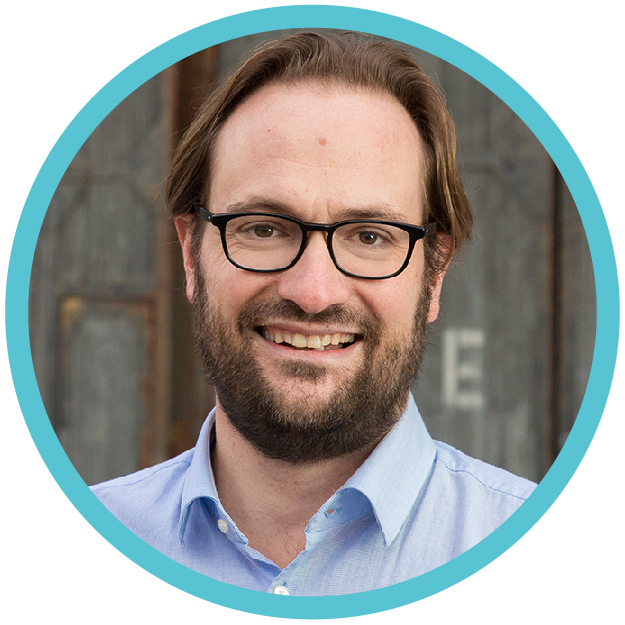
Charles Finlay
Executive Director, Rogers Cybersecure Catalyst, Ryerson University
Herding Cats, Carefully: Driving Collaboration in Canadian Cybersecurity
Read Bio
Stefan Lüders, PhD
Computer Security Officer, CERN Computer Security Incident Response Team
CERN: The Difficult Balance between Academic Freedom, Industrial Installations, and Cybersecurity
Read Bio
Wency Lum
Associate Vice-President University Systems and Chief Information Officer, University of Victoria
State of the Nation
Read Bio
Dr. Mitra Mirhassani
Associate Professor, Electrical and Computer Engineering Department, University of Windsor
Hardware Trojan War!
Read Bio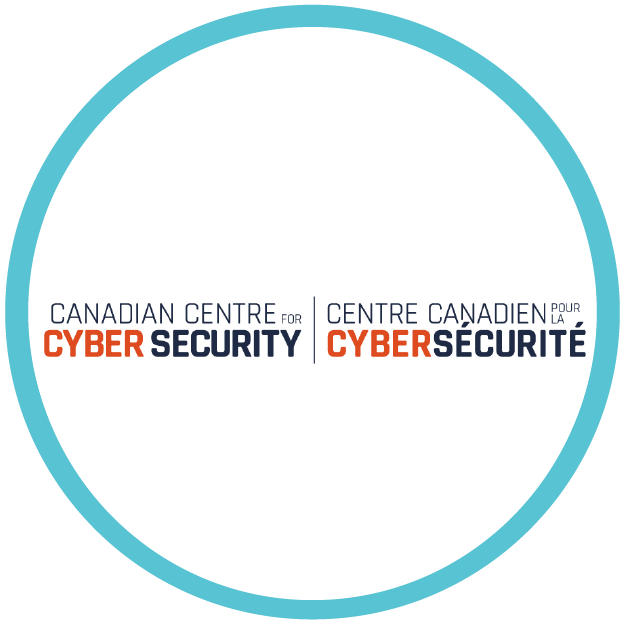
Rasha Nasra
Cybersecurity Engagement Lead – Academics, Canadian Centre for Cyber Security
State of the Nation
Read BioKeynote: Keren Elazari
The Friendly Hacker - Security Analyst, Researcher and Public Speaker
Keren Elazari is an internationally recognized security analyst, researcher, writer, and speaker. Since 2000, Keren has worked with leading Israeli security firms, government organizations, big 4 and Fortune 500 companies. Keren covers emerging security technologies as an independent strategic advisor, working with international tech giants and innovative startups.
In 2014, Keren became the first Israeli woman to speak at the prestigious TED Conference. Keren’s talk has been viewed by millions, translated to 30 languages, and chosen for TED’s ‘Most Powerful Ideas’. In 2020, Keren’s TED talk is still one of TED’s most watched talks on the topic of security and hacking.
Keren holds a CISSP certification, an MA in Security Studies, and is a senior researcher at the Interdisciplinary Cyber Research Center at Tel Aviv University and a visiting faculty member of Reichman University, Israel’s leading private university. Keren is the founder of Israel’s largest security community event, BSidesTLV, and a co-founder of the Leading Cyber Ladies, a global professional network for Women in Cyber Security.
What We Can All Learn from Hackers About Cyber Security
Cybersecurity is no longer about protecting secrets. It’s about our way of life that relies on digital technology, everywhere: from clouds to smartphones, from medical sensors to stock markets and so much more. And we are all on the front lines of the digital realm. Keren Elazari, security researcher, TED Speaker and Friendly Hacker, joins us to shed light on security lessons we should all learn from hackers, showing us how everyone can build their digital immune system – and build a safer future.
Keynote: Stephanie Carvin
Associate Professor, Norman Paterson School of International Affairs, Carleton University
Stephanie Carvin is an Associate Professor at the Norman Paterson School of International Affairs, Carleton University. Her research interests are in international and national security and technology. Currently, she is teaching in the areas of critical infrastructure protection, technology and warfare, and intelligence and national security. Stephanie holds a PhD from the London School of Economics. Among other publications, she is the author of Stand on Guard: Reassessing Threats to Canada’s National Security (University of Toronto Press: 2021) and co-author of the forthcoming Intelligence and Policy Making: The Canadian Experience (Stanford 2021). From 2012-2015, she was an intelligence analyst with the Government of Canada focusing on national security issues.
Responsible Research Security
National security agencies and researchers, particularly in academia, have not traditionally been partners. Indeed, during the Cold War, national security agencies often viewed academics as a subversive threat, and academia saw national security as a part of the surveillance state. Recent stories in the news, however, have highlighted possible negative consequences of certain research partnerships, particularly in states with authoritarian governments. This is causing a re-evaluation of how these two different communities should engage one another, including the introduction of new national security guidelines for researchers. This presentation will provide an overview of the threat environment currently facing the country, particularly in the cyber-realm. It will also highlight the risks in bringing national security institutions into research labs, and what researchers should be thinking about and asking for to mitigate these risks.
Keynote: Roni Zehavi
CEO, Rontali
Roni Zehavi is currently the CEO of Rontali, a privately held company specialized in leading Global digitization projects, from establishment of sustainable and scalable clusters in developing countries, to comprehensive solutions in the domain of smart transportation and aviation.
Prior to that position, Roni was the co-founder and CEO of CyberSpark, aimed at leveraging the Israeli Cyber Ecosystem in Be’er-Sheva into the Global Cyber Capital, unprecedented the world over in terms of innovation and potential.
In the past 5 years, CyberSpark has turned into a leading entity within the Israeli cyber arena. Working with hundreds of cyber companies from start-ups to global corporates, research centers, academia, governmental institutes (authorities and operation such as the CERT) and innovation spaces (incubators, accelerators, VCs). In 2014 Roni co-founded Global EPIC, a global community of cyber ecosystems, covering more than 27 hubs from across the world, from which he held until recently the position of Global President. Roni is a worldwide recognized expert in the domain and a well-known figure as a speaker and moderator in events such as CyberTech, STS Forum, WEF Cyber forum, and more. As such, Roni acts as board member in centers of cyber entrepreneurism and innovation such as LORCA.
Roni has more than 25 years of proven success in the entrepreneurial hi-tech arena, integrating highly innovative and multidisciplinary technologies into sellable products. His range of experience includes stewarding ideas through the development process into the marketplace. One of his recent companies is To-Be-Education, a creative platform upon which teachers and students can upload content that can be transformed into dilemma-based learning games with multiple users, facilitating the develop of global learners’ communities.
In 2004 Roni founded Rontal Applications, a leading provider of a 3D based application for simulations and real-time command & control systems. Under his leadership, the company has achieved successful results before being acquired by an American corporation. Being an experienced test pilot and flight test engineer from ETPS UK and an aeronautical engineer from the Technion, Roni is also a well-known expert in aviation professions, including operational, methodological, and technological aspects.
Building Sustainable and Scalable Innovation Ecosystems: Globalizing the Local and Localizing the Global
Roni will speak about the strategic processes that underpin the development of a successful cybersecurity ecosystem like CyberSpark, the evolution from CyberSpark to Global EPIC, and how jurisdictions may align to these approaches as they work to develop their cybersecurity ecosystems.
Phil Armstrong
President & CEO, Macanthium Ventures Inc.
Phil Armstrong is the President & CEO of Macanthium Ventures Inc., a board advisory and technology investment company. In March 2021, Phil retired from his position as EVP & Global CIO, of Great-West Lifeco Inc., a holding company that includes Canada’s oldest life insurance company, the 2nd largest pension administrator in the US, and a global asset manager with over $2 Trillion in assets under administration.
Phil has led expansions and technology transformations for some of Canada’s largest global financial services companies. He is a seasoned corporate director, strategic advisor, founder, author, and FinTech investor with over 40 years of global financial services experience as a former Global C-suite executive and technologist.
In 2020, Phil was inducted into the CIO Hall of Fame as its first and only Canadian-based CIO. InsurTech magazine described him as the world’s 3rd most influential InsurTech executive. Phil is a recognized cybersecurity expert, risk management professional, and visionary, with over 20 years of serving on a variety of boards. He currently serves as a board member of the Canadian CIO strategy council (Ottawa) and as chairman of the board for the Technology Business Management TBM council (Bellevue, USA) with boards in Europe, Japan, Asia, and North America. Previously, Phil served as the chairman of the board for the CCMA (Canadian Capital Markets Association); chairman and board member of the Canadian Institutional Trade Matching Committee; chairman of the Sun Life Business Center PVT LTD (India and the Philippines); board member for York University – Faculty of Atkinson Liberal Arts & Professional Studies (Toronto, Canada); and Global CIO advisory boards for Microsoft, Cisco and IFDS. Today, Phil provides strategic advice to Accenture LLP (Global), Zscaler (San Jose), The Trusted Advisory Board (Munich), and ISA Cybersecurity (Toronto). Phil is completing his ICD.D at Rotman, (U of T), and holds both securities and derivatives certifications from Canada, he graduated with a B/Tec from the University of Leeds (Keighley College) UK, and a B.Comm from York University, Canada.
The Great Cyber Reset
Why cybersecurity professionals are hitting the pause button on their cybersecurity strategies and rethinking their architectures and approaches for a more sustainable cyber approach.
Dr. Barb Carra
President and CEO, Cybera
Dr. Barb Carra is the President and CEO of Cybera, a not-for-profit, technology-neutral organization responsible for driving Alberta’s economic growth through the use of digital technology, as well as facilitating Alberta’s Research and Education Network. She is a respected leader and collaborative partner within Canada’s National Research and Education Network (NREN) landscape.
With a PhD in applied research, spatial statistics, and data modeling, Barb has over a decade of experience in data analytics and policy, which allows her to act as a bridge between research and technical domains. That insight has proved vital to Cybera, which frequently acts as a steward and advocate for Alberta research and data-driven decisions. Barb spearheaded the development of Cybera’s policy, strategic, and operational initiatives, including programs that are strengthening the cybersecurity posture of Alberta’s education sectors.
State of the Nation Panel
This session will introduce guests to representatives of key communities and organizations involved in cybersecurity for the research and education sector. The panel will focus on the assets and initiatives currently available in the ecosystem, how to best coordinate and leverage these assets, and how communities can work together to continue to strengthen the cybersecurity capabilities of research and education organizations connected to Canada’s NREN.
Charles Finlay
Executive Director, Rogers Cybersecure Catalyst, Ryerson University
Charles founded the Rogers Cybersecure Catalyst in 2018 with a vision to build Canada’s leading hub for cybersecurity innovation and collaboration. Charles oversees all aspects of the Catalyst’s program delivery and strategic growth. Charles has been instrumental in developing nationally unique programming in cybersecurity training, commercialization, public education, and policy development.
Prior to founding the Catalyst, Charles served as chief of staff and director of policy to the Ontario Minister of Economic Development and Growth. In this role, Charles worked closely with private sector and government leaders to develop and implement the province’s strategy to make Ontario a global leader in technology innovation and commercialization.
Before joining government, Charles practiced law at BMO Capital Markets and Torys LLP, worked as a technology researcher at Forrester Research, and was a freelance business journalist for The Globe and Mail and Canadian Business Magazine.
Charles has served on the boards of The Gerstein Centre, Social Planning Toronto, and Houselink Community Homes.
Charles holds degrees from Queen’s University, University College London, and the Schulich School of Law at Dalhousie University.
Herding Cats, Carefully: Driving Collaboration in Canadian Cybersecurity
People must be the core of any effective cybersecurity solution. But we face major people-related challenges in the Canadian cybersecurity ecosystem: major labour market shortages and a sector that is not as diverse as it needs to be. In this session I will explore how governments, the private sector, and academic institutions are coming together to tackle these vital issues.
June Leung
Senior Manager, Identity and Access Management, Moneris
June has over 15 years of experience in the Information Security field, leading identity and access management and encryption programs within the Canadian financial industry, including Moneris, RBC, TD and FundSERV. June currently leads identity and access management at Moneris and is responsible for managing and continuously evolving the identity and access management programs and capabilities including, EIAM, CIAM, PAM and cryptography.
Prior to joining Moneris, June was the Director for IAM under second line performing oversight and challenge in cybersecurity at RBC.
June holds a Bachelor of Arts from the University of Guelph and various security certifications including CISSP, CISM and CRISC. She regularly coaches young professionals in their pursuits of cybersecurity careers, including talks at Cyber & Tech Risk and at Ryerson University.
IAM in the Spotlight
Digital identities are foundational to any organization’s cybersecurity strategy. The context of higher education, with transient student and faculty populations, bring-your-own-device policies, specific researcher requirements, and evolving external threats, presents a unique set of challenges when implementing identity and access management systems. June will present a view of how these challenges may be approached, discuss how process integrity is critical, and explain how identity and access management systems and processes may evolve in future.
Stefan Lüders, PhD
Computer Security Officer, CERN Computer Security Incident Response Team
Stefan Lüders, PhD, graduated from the Swiss Federal Institute of Technology in Zurich and joined the European Organization for Particle Physics (CERN) in 2002. Since 2009, he has headed the CERN Computer Security Incident Response Team as CERN’s Computer Security Officer with the mandate to coordinate all aspects of CERN’s computer security – office computing security, computer centre security, GRID computing security, and control system security – while balancing CERN’s operational needs. Dr. Lüders has presented on computer security and control system cyber-security topics at many different occasions to international bodies, governments, and companies, and published several articles.
CERN: The Difficult Balance between Academic Freedom, Industrial Installations, and Cybersecurity
The Large Hadron Collider (LHC) at the European Organization for Nuclear Research (CERN) is a unique one-off prototype within the particle physics community. The accelerator itself and its attached experiments are developed, managed, and operated by a world-wide community of physicists, engineers, and technicians. In parallel, CERN serves as a university-like campus for this community and provides the IT environment for massive data storage, computing clusters, and any other service needed to enable collaboration and research. As such, “one-off prototype” and “world-wide community” plus the general attitude of an academic environment present particular challenges in securing CERN’s data centres, the office networks, and the multitude of different control systems deployed for running the LHC and its experiments. Finding the right balance is essential without compromising a decent level of cybersecurity.
Wency Lum
Associate Vice-President University Systems and Chief Information Officer, University of Victoria
Wency Lum is the Associate Vice-President University Systems and Chief Information Officer at the University of Victoria (UVic). In this role, she is responsible for the institution’s IT strategy, policy, governance, and projects to enable UVic’s academic, research and administrative functions. She also leads the operation of Arbutus, which is Canada’s national research cloud platform under the Compute Canada Federation.
Wency serves on Boards for BCNET, the higher education shared services organization for BC’s 25 post-secondary institutions, the Canadian University Council of CIOs (CUCCIO), and Victoria Foundation, a community organization. Her work in cybersecurity in higher education includes roles as chair of BCNET’s Cybersecurity and Identity Management Services Committee, membership on CUCCIO’s Standing Committee on Cybersecurity, CANARIE’s Cybersecurity Advisory Committee, and the Compute Canada Cybersecurity Steering and Advisory Committee.
Wency holds a Bachelor of Science from McGill University and a Master of Business Administration from UVic. She is also a Certified Information Systems Auditor, and Project Management Professional.
State of the Nation Panel
This session will introduce guests to representatives of key communities and organizations involved in cybersecurity for the research and education sector. The panel will focus on the assets and initiatives currently available in the ecosystem, how to best coordinate and leverage these assets, and how communities can work together to continue to strengthen the cybersecurity capabilities of research and education organizations connected to Canada’s NREN.
Dr. Mitra Mirhassani
Associate Professor, Electrical and Computer Engineering Department, University of Windsor
Mitra Mirhassani is an associate professor at the Electrical and Computer Engineering Department at the University of Windsor. Her research interests include hardware security, Trojan detection, and quantum-safe encryption.
She and her team are investigating a range of hardware security issues such as detecting malicious Trojan hardware, efficient implementation of post-quantum algorithms, and implementation of Public Unclonable Functions.
Mitra Mirhassani is a senior member of IEEE and serves as the Associate Editor for IEEE Access Journal and Guest Associate Editor of IEEE Transaction on Computer-Aided Design. She is the advisor to the WiCyS (Women in Cybersecurity) Windsor chapter. She was recognized as one of the Top Women in Cybersecurity by IT World Canada in 2020 and won the 2020 Outstanding Achievement award from the APMA Cybersecurity Institute. She is co-founder and the co-director of the SHIELD – Automotive Cybersecurity Centre of Excellence.
Hardware Trojan War!
The globalization of the integrated circuit (IC) design and fabrication processes has emerged severe concerns related to the trustworthiness and security of manufactured ICs. The complexity of the different steps in the implementation of integrated systems has pushed the semiconductor industry to form an IC supply chain, in which each step is accomplished in a different geographical site. These various site locations, usually in different continents, increase the risk of malicious chips. A dormant logic circuit, traditionally known as the hardware Trojan (HT) can be introduced to the original system by a culprit to affect the normal performance. Since HT implants in sensitive fields such as military, power infrastructures, telecommunications, aviation, automotive, and health care applications can result in irrecoverable disasters, proper defence mechanisms to detect and disable an HT circuit must be designed.
Rasha Nasra
Cybersecurity Engagement Lead – Academics, Canadian Centre for Cyber Security
Rasha Nasra leads engagements and partnerships for Academia at the Canadian Centre for Cyber Security. She holds a doctoral degree in Educational Leadership from Western University and a Master’s degree in Educational Technology from Concordia University. Rasha has previously held different roles at the Cyber Centre, including leading a Strategic Cyber Threat Assessments team. Prior to joining the Cyber Centre, she held different managerial and academic positions at organizations including Canada Post Corporation and Ryerson University.
State of the Nation Panel
This session will introduce guests to representatives of key communities and organizations involved in cybersecurity for the research and education sector. The panel will focus on the assets and initiatives currently available in the ecosystem, how to best coordinate and leverage these assets, and how communities can work together to continue to strengthen the cybersecurity capabilities of research and education organizations connected to Canada’s NREN.
Tim Stupich
Senior Director, Business Development, CANARIE
Since joining CANARIE in March 2021, Tim has been engaged in establishing partnerships with stakeholder communities to explore and define new business opportunities for CANARIE and provide recommendations to improve the successful development and execution of business strategies and programs, particularly in cybersecurity.
Tim came to CANARIE from Mitacs, where he developed strategies to strengthen business-driven research internships in key priority areas, including Indigenous initiatives, aerospace, optical satellite communications technology for improved broadband in rural and remote communities as well as collaborations with the National Research Council (NRC) Supercluster and NRC Challenge programs.
Tim also has an extensive career in the federal government. where he served as Director for the development of the Digital Research Infrastructure Strategy, the $2 billion Knowledge Infrastructure Program, and strategic contributions to research organizations including Canada Foundation for Innovation, Genome Canada, Canadian Institute for Advanced Research, Institute for Quantum Computing, Council of Canadian Academies, and many others.
Tim is a Professional Engineer and holds a Mechanical Engineering degree and an MBA from the University of Manitoba.
Program
All Summit sessions will be presented in English.
| November 16, 2021 | ||
| Day 1 | Building the Team | |
| 1:00 p.m. ET | Welcome Remarks | |
| 1:10 - 2:00 p.m. ET | Keynote Presentation: Keren Elazari | |
| 2:00 – 2:45 p.m. ET | Plenary Summit Session: Phil Armstrong | |
| 2:45 – 3:00 p.m. ET | Break and Networking | |
| 3:00 – 3:45 p.m. ET | Plenary Summit Session: Charles Finlay | |
| 3:45 – 4:00 p.m. ET | Wrap-up and Preview of Day 2 | |
| November 17, 2021 | ||
| Day 2 | Redefining the Playbook | |
| 1:00 p.m. ET | Welcome Remarks | |
| 1:10 – 2:00 p.m. ET | Keynote Presentation: Roni Zehavi | |
| 2:00 – 2:45 p.m. ET | Plenary Summit Session: Dr. Stefan Lüders | |
| 2:45 – 3:00 p.m. ET | Break and Networking | |
| 3:00 – 3:45 p.m. ET | Plenary Summit Session: June Leung | |
| 3:45 – 4:00 p.m. ET | Wrap-up and Preview of Day 3 | |
| November 18, 2021 | ||
| Day 3 | Expanding the Toolkit | |
| 1:00 p.m. ET | Welcome Remarks | |
| 1:10 – 2:00 p.m. ET | Plenary Summit Session: Dr. Mitra Mirhassani | |
| 2:00 – 2:45 p.m. ET | Summit Panel Session: Dr. Barb Carra, Wency Lum, Rasha Nasra | |
| 2:45 – 3:00 p.m. ET | Break and Networking | |
| 3:00 – 3:45 p.m. ET | Keynote Presentation: Stephanie Carvin | |
| 3:45 – 4:00 p.m. ET | Summit Wrap-up | |
Registration
All fees are in CAD and are subject to HST.
| CANARIE Members* | Non-Members | |
|---|---|---|
| CANARIE Summit (3 days / 1:00 p.m. - 4:00 p.m. ET) | $0 | $49 |
*Check to see if your organization is a CANARIE Member.
REGISTER NOWSponsorship
The CANARIE Summit is an annual showcase for trailblazing visionaries from academia, the private sector, and the public service who discuss their transformative work with an intimate gathering of Canada’s research, education, and innovation communities.
Engaging plenary sessions led by Canadian and international speakers aim to inspire attendees to learn, discuss, and collaborate on what it takes to make Canada a global leader in data-driven innovation.
Given the virtual nature of the 2021 CANARIE Summit, we’re offering the same benefits to all sponsors.
| Fee: $2,600 (Non-Members) | $0 (CANARIE Members)* |
|---|
| Complimentary registration for staff |
| Promoted in Summit communications, including social media |
| Logo and website link on CANARIE Summit website |
| List of consented Summit attendees |
| Sponsor video posted on virtual platform |
| “Breakout room” on virtual platform to engage with Summit guests |
| Recognition in CANARIE Summit press release and in opening remarks |
*CANARIE Members may apply their annual $2,600 discount toward Summit Sponsorship. This Member discount can only be used if it has not yet been applied toward participation fees in the Canadian Access Federation (CAF).
CANARIE reserves the right to accept or decline any sponsorship requests.
How to Become a Sponsor
- Please complete the Sponsorship Agreement on the last page of the Prospectus;
- Send the signed Agreement + a high-resolution logo to sponsorship@canarie.ca;
- Once steps #1 and #2 are complete, an invoice will be issued and the promotion of your brand through CANARIE communications channels will begin.
Questions?
Ela Yazdani
Director of Communications, CANARIE
ela.yazdani@canarie.ca | 613-282-1584






